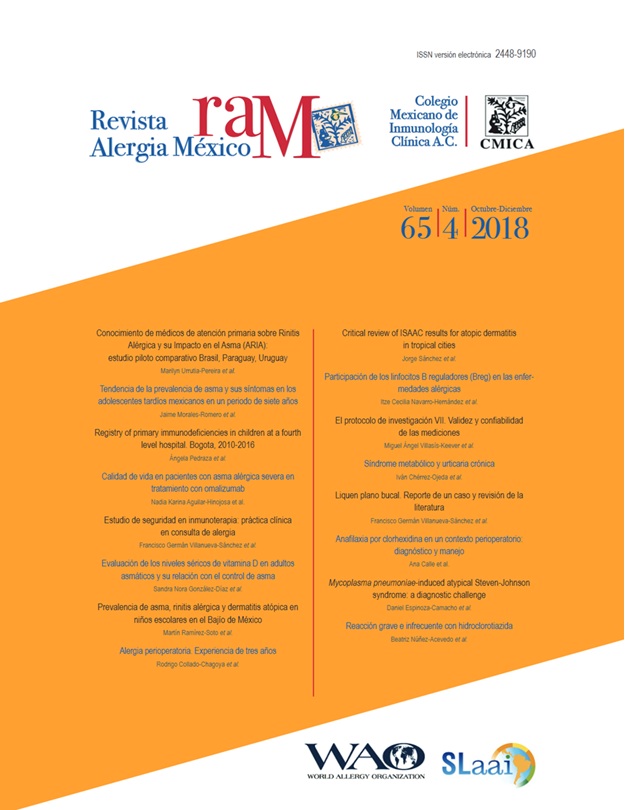Abstract
Background: Omalizumab is a monoclonal antibody that controls severe allergic asthma symptoms and reduces exacerbations.
Objective: To analyze quality of life and respiratory function improvement using the mini-AQLQ questionnaire and spirometry, with the use omalizumab as complementary therapy to a treatment with inhaled corticosteroids and long-acting beta 2 agonists.
Methods: Of 30 patients with severe asthma (90 % of females, mean age, 49.1 years) the evolution of severe asthma diagnosis ranged from 1 to 24 years (average 8.3 years). All of them had at least one cutaneous or IgE-specific test that was positive to a usual aeroallergen, had total IgE determined and underwent spirometry. The mini-AQLQ questionnaire was applied and forced expiratory volume in 1 second (FEV1) was determined at baseline and at 52 weeks of omalizumab administration, the average dose of which was 550 mg, with biweekly or monthly administration.
Results: There was statistically significant improvement (p = 0.013) in the mini-AQLQ after 52 weeks, with an overall score of 4.5, mainly in the emotional (p = 0.0073) and environmental dimensions (p = 0.00014). There were no significant changes in FEV1. Obesity was observed in 63 % of patients, and overweight in 26 %.
Conclusions: Omalizumab improved patient quality of life, with no significant changes in FEV1, probably due to obesity.
References
Bousquet J, Bousquet PJ, Godard P, Daures JP. The public health implications of asthma. Bull World Health Organ. 2005;83(7):548-554.
Rojas-Molina N, Legorreta-Soberanis J, Olvera-Guerra JF. Prevalencia y factores de riesgo de asma en municipios del estado de Guerrero, México. Rev Alergia Mex. 2001;48(4):115-118.
Rodríguez A, Pérez A, Cardoso S. Prevalencia comparada de asma y rinitis alérgica entre niños y adultos michoacanos: escuelas públicas de Morelia. Rev Invest Clin. 2007;59:90-92.
Vargas-Becerra MH. Epidemiología del asma. Neumol Cir Torax. 2009;68(Supl 2):91-97. Disponible en: http://www.medigraphic.com/pdfs/neumo/nt-2009/nts092c.pdf
Global Initiative for Asthma. Global strategy for asthma management and Prevention 2004. Global Initiative for Asthma; 2004. Disponible en: https://ginasthma.org/archived-reports/
Corren J, Kavati A, Ortiz B, Vegesna A, Colby JA, Ruiz K, et al. Patient-reported outcomes in moderate-to-severe allergic asthmatics treated with omalizumab: a systematic literature review of randomized controlled trials. Curr Med Res Opin. 2018;34(1):65-80. DOI: 10.1080/03007995.2017.1395734
Moore WC, Peters SP. Severe asthma: an overview. J Clin Inmmunol. 2006;117(3):487-494. DOI: 10.1016/j.jaci.2006.01.033
American Thoracic Society. Proceedings of the ATS workshop on refractory asthma: current understanding recommendations and unanswered questions. Am J Respir Crit Care Med. 2000;162(6):2341-2351. DOI: 10.1164/ajrccm.162.6.ats9-00
Rubio-Padilla M, Río-Navarro B, Hilda SN, Sienra-Monge JJL. Asma de difícil control. Revisión de la bibliografía. Rev Alerg Mex. 2009;59(4):115-123.
Pacheco-Galván A, Hinojosa-Macías M, Hurtado-Barbudo B, González-Cervera J, Sueiro-Bendito A. Control del asma y de la calidad de vida en pacientes asmáticos alérgicos graves con tratamiento anti-IgE (omalizumab). Med Clin (Barc). 2009;133(12):460-463. DOI: 10.1016/j.medcli.2009.07.011
Chung KF, Wenzel SE, Brozek JL, Bush A, Castro M, Sterk PJ, et al. International ERS/ATS guidelines on definition, evaluation, and treatment of severe asthma. Eur Respir J. 2014;43(2):343-373. DOI: 10.1183/09031936.00202013
Global Initiative for Asthma. Global strategy for asthma management and Prevention 2018. Global Initiative for Asthma; 2018. Disponible en: https://ginasthma.org/archived-reports/
Wenzel SE. Characteristics, definition and phenotypes of severe asthma. En: Chung KF, Bel EH, Wenzel SE, editores. Difficult to treat severe asthma. Serie European Respiratory Monograph. Reino Unido: European Respiratory Society; 2011.
McKeage K. Omalizumab: a review of its use in patients with severe persistent allergic asthma. Drugs. 2010;73(11):1197-1212. DOI: 10.1007/s40265-013-0085-4
Vennera-Trunzo MC. Omalizumab: estudios clínicos y en la “vida real” para el tratamiento del asma bronquial. Monogr Arch Bronconeumol. 2015;2(4):92-99.
Chipps B, Buhl R, Beeh KM, Fox H, Thomas K, Reisner C. Improvement in quality of life with omalizumab in patients with severe allergic asthma. Curr Med Res Opin. 2006;22(11):2201-2208. DOI: 10.1185/030079906X148643
Rubin AS, Souza-Machado A, Andrade-Lima M, Ferreira M, Ferreira F, Honda A, et al. Effect of omalizumab as add-on therapy on asthma-related quality of life on severe allergic asthma: a Brazilian study (QUALITX). J Asthma. 2012;49(3):288-293. DOI: 10.3109/02770903.2012.660297
Méndez-Guerra M, Salas-Hernández J, Vargas MH, Pérez-Chavira R, León-Munguía L, Franco-Martínez S, et al. Calidad de vida en pacientes asmáticos mexicanos. Rev Inst Nal Enf Resp Mex. 2003;16(4):235-242. Disponible en: http://www.medigraphic.com/pdfs/iner/in-2003/in034f.pdf
Vargas-Correa J, Bracamonte-Peraza R, Espinosa-Morales S, Vázquez-Nava F. Experiencia clínica con omalizumab en pacientes con asma severa. Datos del mundo real. Rev Alerg Mex. 2016;63(3):216-226. DOI: 10.29262/ram.v63i3.144
Niven R, Chung KF, Panahloo Z, Ayre G. Effectiveness of omalizumab in patients with inadequately controlled severe persistent allergic asthma: an open-label study. Resp Med. 2008;102(10):1371-1378. DOI: 10.1016/j.rmed.2008.06.002

This work is licensed under a Creative Commons Attribution-NonCommercial 4.0 International License.
Copyright (c) 2018 Revista Alergia México

